中考英语知识点讲解 (14)
中考必考单词知识点讲解(1511-1540词讲义)

2024届九年级中考英语一轮复习【词汇短语专题】中考必考单词知识点讲解(15111540词讲义)每日单词积累,祝同学们中考顺利!1511、wake动词,弄醒;叫醒→woke(过去式)→woken(过去分词)wake sb up叫醒某人Don't wake a man who pretends to be asleep.不要叫醒一个装睡的人。
1512、want动词,需要;想要want to do sth想做某事want sb to do sth想要某人做某事What do you want to be when you grow up?你长大了想做什么?Teachers Wanted1513、warn动词,警告;告诫;提醒→warning名词,警告warn sb not to do sth警告某人不要做某事warn sb against doing sth警告某人不要做某事1514、wash动词,洗;洗涤;清洗wash away冲掉;冲走wash the dishes洗餐具do some washing洗衣服1515、wear动词,穿戴;佩戴;留(胡须、头发);带有(表情或样子)→wore(过去式)→worn(过去分词)wear a coat/hat/ring/badge/watch/tie穿外衣;戴帽子/戒指/徽章/手表/领带wear glasseswear a red dress穿一条红裙子wear a beard留胡须wear out(被动be worn out)穿破He wore out two pairs of shoes last year.去年他穿坏了两双鞋。
1516、weigh动词,重量是……;称……的重量→weight名词,重量;分量lose weight减肥put on weight增加体重1517、will将要;会would(过去式)be willing to do dth乐意做某事I will go to the airport to meet my friend tomorrow。
中考英语语法二轮复习:代词考点14+many,much,few,little知识点总结

中考英语语法二轮复习【全国通用】代词考点讲义14【精讲版】many,much,few,little知识点总结many与much的若干用法1.两者都表示“许多”,但 many 修饰或代替可数名词(复数),与 few (少数)相对;而 much 用来修饰或代替不可数名词(单数),与little(少量)相对。
如:Did you see many people there? 你在那儿看见许多人了吗?Many poets have died young. 许多诗人很年轻就死了。
Do you have much money left? 你剩的钱多吗?He doesn’t spend much time preparing his lessons.他备课不花太多时间。
2.关于many of 和 much of:(1)其后接名词时,该名词通常应是特指的(比如有the, these, those, my, our, Tom’s等修饰)。
如:Many of the farmers grow rice. 很多农民种稻子。
Many of his ideas were amusing to her. 他的许多想法使她感到有趣。
He spends much of his time outdoors. 他很多时间都在户外度过。
Much of the land was flooded. 大片土地被水淹没。
(2)如果名词没有表特指的限定词,通常就不用of。
如:她没有吃多少早餐。
误:She didn’t eat much of breakfast.正:She didn’t eat much breakfast.大玻璃杯剩下的不多了。
误:There aren’t many of large glasses left.正:There aren’t many large glasses left.(3)如果用了介词of又没有特指限定词,通常是不可以的。
人教版中考英语复习教材核心词汇知识点精讲精练九年级全册Unit13-Unit14

9. 采取行动 10. 对……产生影响或作用 11. 扔掉; 抛弃 12. 好好利用某物 13. 拆下; 摧毁 14. 恢复; 使想起; 归还 15. 有创意 16.io_n_ _m__a_k_e_a_d__if_fe_r_e_n_c_e_t_o_ _t_h_r_o_w__a_w_a_y_ _p_u_t_s_t_h_. _to__g_o_o_d_u__se_ _p_u_l_l _. _. _. _d_o_w_n_ _b_r_in__g_b_a_c_k_ _h_a_v_e_a__c_re_a_t_i_v_e_m__in_d_ _t_u_r_n_u_p_s_i_d_e_d_o_w__n_
【句式填写】 1. 我们正尽力拯救地球! We’re trying _to_ _s_a_v_e the earth! 2. 哦, 为了减少空气污染, 我们应该乘公共汽车或坐地铁代替开车。 Well, to cut down air pollution, we _s_h_o_u_ld_ _t_a_k_e the bus or subway instead of _d_r_iv_i_n_g_. 3. 因此, 我们齐心协力就能带来变化, 创造更加美好的未来。 So together, our actions _c_a_n_ _m__a_k_e _a_ _d_i_ff_e_r_e_n_c_e and _le_a_d_ _t_o a better future!
人教版中考英语复习教材核心词汇知识点精讲精练 九年级全册 Units13~14
基础梳理 夯实竞争力
【核心词汇】 1. 乱扔 v. 垃圾; 废弃物 n. 2. 底部; 最下部n. 3. 渔民; 钓鱼的人n. 4. 煤; 煤块 n. 5. 丑陋的; 难看的adj. 6. 花费v. 花费; 价钱 n. 7. 塑料的 adj. 塑料; 塑胶n.
初中英语中考知识点总结归纳完整版
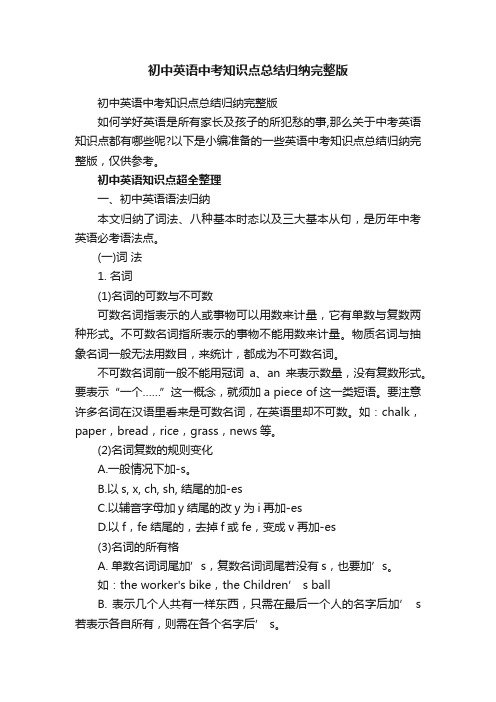
初中英语中考知识点总结归纳完整版初中英语中考知识点总结归纳完整版如何学好英语是所有家长及孩子的所犯愁的事,那么关于中考英语知识点都有哪些呢?以下是小编准备的一些英语中考知识点总结归纳完整版,仅供参考。
初中英语知识点超全整理一、初中英语语法归纳本文归纳了词法、八种基本时态以及三大基本从句,是历年中考英语必考语法点。
(一)词法1. 名词(1)名词的可数与不可数可数名词指表示的人或事物可以用数来计量,它有单数与复数两种形式。
不可数名词指所表示的事物不能用数来计量。
物质名词与抽象名词一般无法用数目,来统计,都成为不可数名词。
不可数名词前一般不能用冠词a、an来表示数量,没有复数形式。
要表示“一个……”这一概念,就须加a piece of这一类短语。
要注意许多名词在汉语里看来是可数名词,在英语里却不可数。
如:chalk,paper,bread,rice,grass,news等。
(2)名词复数的规则变化A.一般情况下加-s。
B.以s, x, ch, sh, 结尾的加-esC.以辅音字母加y结尾的改y为i再加-esD.以f,fe结尾的,去掉f或fe,变成v再加-es(3)名词的所有格A. 单数名词词尾加’s,复数名词词尾若没有s,也要加’s。
如:the worker's bike,the Children’ s ballB. 表示几个人共有一样东西,只需在最后一个人的名字后加’ s 若表示各自所有,则需在各个名字后’ s。
如:This is Lucy and Licy’ s room.These are Kate's and jack’ s rooms.C. 如果是通过在词尾加—s构成的复数形式的名词,只加’。
如:the students’ books,the girls’ blouses(另外:名词+of+名词名词是有生命的,我们就用’s结构来表示所有关系。
如果名词所表示的事物是无生命的,我们就要用名词+of+名词的结构来表示所有关系。
中考英语复习讲义 第14章 句子成分

第十四章句子成分句子是构成文章的墓本单位,而每个句子又是由词或短语组成,这些词或短语便是句子的成分。
不同的内容运用不同类型的句式结构,这些句式结构构成了英语中不同的句子种类。
对于句子成分的考查体现出了多样性,单选、完形填空、书面表达等题型都会有所涉及,在学习过程中,正确分析词或短语所充当的句子成分是很重要的。
内容导视知识点1主语知识点2谓语知识点3表语知识点4宾语知识点5定语知识点6状语知识点7宾语补足语知识点8同位语知识详单组成句子的各个部分叫句子成分,句子成分主要有主语、谓语、宾语、表语、定语、状语、宾语补足语和同位语等。
知识点1主语知识点2谓语知识点3表语知识点4宾语知识点5定语知识点6状语知识点7宾语补足语知识点8同位语考点突破考点1考查句子主语1.(济宁中考)-Is that car Mrs. Black's?-No, _______ is a white one.A. sheB. herC. hersD. his【解析】选C,答语缺少主语,名词性物主代词在句中作主语。
故选C,2.(苏州中考)This work needs close teamwork.________ will be achieved unless we work well together.A. NothingB.AnythingC. SomethingD. Everything 【解析】选A, 第二句句意为:“除非我们一起好好工作,否则将一事无成。
’所填词作句子的主语,且表示否定含义,故用Nothing。
故选Ao考点2 考查句子谓语3.(幸感中考)My brother_______ to move the heavy box, but I didn't give up.A. remindedB. refusedC. agreedD. considered【解析】选B。
后半句指自己没有放弃,故前半句中应是表示拒绝。
2024中考英语语法必考知识点总结

2024中考英语语法必考知识点总结一、时态1.一般现在时:表经常性的动作、习惯或客观事实。
2.一般过去时:表示过去发生、结束的动作或状态。
3.一般将来时:表示将来一些时间要发生的动作。
4.现在进行时:表示现在正在进行的动作。
5.过去进行时:表示过去其中一时刻或一段时间内正在进行的动作。
6.现在完成时:表示过去发生并与现在有关的动作或状态。
7.过去完成时:表示过去其中一动作或状态发生在另一过去动作或状态之前。
8. 一般将来时(be going to):表示将要、准备或打算做事。
二、被动语态1. 被动语态的构成:be + 过去分词2.主动语态和被动语态的转换:将主动语态的宾语变为主语,同时动词的形式改为被动语态的形式。
三、虚拟语气1.If从句中的虚拟语气:a)If从句表示与事实相反的情况,主句用过去将来时。
b)If从句表示与现在事实相反的情况,主句用过去时。
c) If从句表示与过去事实相反的情况,主句要用“had + 过去分词”。
2.虚拟条件句的其他情况:a) 与现在相反:as if, though, even if等引导的条件句,主句用过去时。
b)与将来相反:引导条件状语从句的主将从现,主句用过去时。
c)与过去相反:引导条件状语从句的主将从现,主句用过去完成时。
四、宾语从句1.宾语从句:在句子中作宾语的从句。
2.宾语从句的时态:按照实际情况使用时态。
3. 宾语从句的连接词:that, whether, if等。
五、定语从句1. 定语从句的构成:关系词(who, whom, whose, which, that)+句子。
2. 指物的定语从句:关系代词用which或that,在从句中充当主语、宾语或定语。
3. 指人的定语从句:关系代词用who或that,在从句中充当主语或宾语;关系代词用whom或that,在从句中充当宾语。
4. 定语从句的连接词从句中的位置:连接词(who, whom, which, that, whose)在从句中充当成分的位置。
初中英语人教新目标九年级全册Unit 8—Unit 14语法知识点总结

九年级英语全册单元语法知识点Unit 8:It must belong to Carla.第八单元的语法重点是:情态动词表推测。
情态动词表推测情态动词 must,may,might,could,may,can 表示推测含义与用法后面都接动词原形,都可以表示对现在情况的揣测和推断但他们含义有所不同。
① must 一定,肯定(100%可能性)② may,might,could 有可能,也许(20%、80%可能性)③ can't 不可能,不会(可能性几乎为零)如:The dictionary must be mine.It has my name on it.The hair band can't be Bob's.After all,he is boy!【直击中考】1.【吉林长春】20.-Are the glasses Tim's?-No,they _______ be his.He doesn't wear glasses.A.mustB.canC.mustn'tD.can't2.【江苏宿迁】5.-Excuse me,is this the way to No.10 Middle School?-Oh,sory.I'm not sure.But it ______ be.A.mustB.shouldC.needD.mayUnit 9:I like music that I can dance to.第九单元的语法重点是:定语从句。
定语从句★定语从句:在复合句中,修饰某一名词或代词的从句叫做定语从句。
定语从句可以分为限制性定语从句和非限制性定语从句。
本单元主要学习由 who、that、which 引导的限制性定语从句。
★先行词:被定语从句所修饰的名词或代词称为先行词。
★关系代词:引导定语从句的关联词称为关系代词。
关系代词在定语从句中有三个作用:(1)引导定语从句;(2)代替先行词;(3)在定语从句中充当一个成分。
历年中考英语语法知识点难点总结
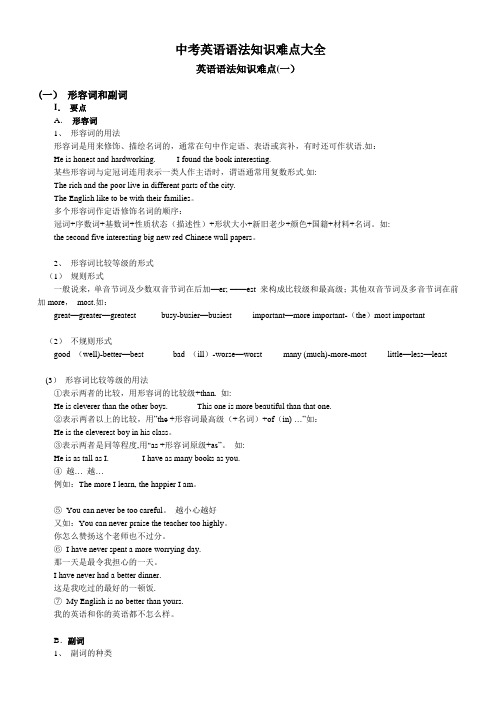
中考英语语法知识难点大全英语语法知识难点(一)(一)形容词和副词I.要点A.形容词1、形容词的用法形容词是用来修饰、描绘名词的,通常在句中作定语、表语或宾补,有时还可作状语.如:He is honest and hardworking. I found the book interesting.某些形容词与定冠词连用表示一类人作主语时,谓语通常用复数形式.如:The rich and the poor live in different parts of the city.The English like to be with their families。
多个形容词作定语修饰名词的顺序:冠词+序数词+基数词+性质状态(描述性)+形状大小+新旧老少+颜色+国籍+材料+名词。
如:the second five interesting big new red Chinese wall papers。
2、形容词比较等级的形式(1)规则形式一般说来,单音节词及少数双音节词在后加—er; ——est 来构成比较级和最高级;其他双音节词及多音节词在前加more,most.如:great—greater—greatest busy-busier—busiest important—more important-(the)most important(2)不规则形式good (well)-better—best bad (ill)-worse—worst many (much)-more-most little—less—least(3)形容词比较等级的用法①表示两者的比较,用形容词的比较级+than. 如:He is cleverer than the other boys. This one is more beautiful than that one.②表示两者以上的比较,用”the +形容词最高级(+名词)+of(in) …”如:He is the cleverest boy in his class。
中考英语知识点复习
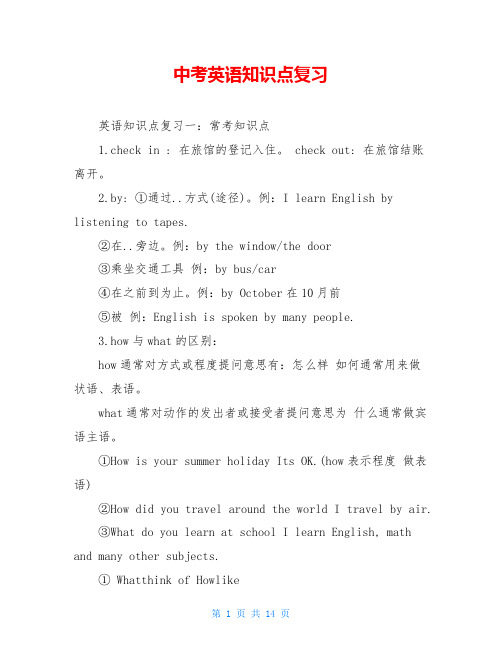
中考英语知识点复习英语知识点复习一:常考知识点1.check in : 在旅馆的登记入住。
check out: 在旅馆结账离开。
2.by: ①通过..方式(途径)。
例:I learn English by listening to tapes.②在..旁边。
例:by the window/the door③乘坐交通工具例:by bus/car④在之前到为止。
例:by October在10月前⑤被例:English is spoken by many people.3.how与what的区别:how通常对方式或程度提问意思有:怎么样如何通常用来做状语、表语。
what通常对动作的发出者或接受者提问意思为什么通常做宾语主语。
①How is your summer holiday Its OK.(how表示程度做表语)②How did you travel around the world I travel by air.③What do you learn at school I learn English, math and many other subjects.① W hatthink of Howlike② Whatdo with Howdeal with③ Whatlike about Howlike④ Whats the weather like today Hows the weather today⑤ What to do How to do ite.g. What do you think of this book=How do you like this bookI dont know what I should do with the matter.=I dont know how I should deal with it.What do you like about China=How do you like ChinaI dont know what to do ne_t step=I dont know how to do it ne_t step㊣ What good / bad weather it is today!(weather为不可数名词其前不能加 a )㊣ What a fine / bad day it is today! (day为可数名词其前要加 a )4. aloud, loud与loudly的用法:三个词都与大声或响亮有关。
河北冀教版中考英语 14_第14课时 九年级(全) Unit 3~Unit 4

单项选择
①I found a nail B into the tyre.
A.sticks
B.sticking C.to stick D.stuck
②The old woman walks with the help of her walking A .
A.stick B.bar
C.wood
D.tree
词汇 用法
例句
safe safety
形容词,意为“安全的;平安的”,反义词是 We need to find a safe place.我们需要找一个安全的地方。 dangerous 名词,意为“安全,平安”,反义词是danger I’m worried about the safety of the treatment.我担心这种疗法是否安全。
9. protect...from 使……免于……;防止……遭受…… 10. keep an eye out for 密切注意;提防;警觉 11. compared with 和……相比较 12. a set number of 一定数量的 13. make one’s living 谋生 14. jump into 跳入……中;潜入 15. once upon a time 从前 16. run away 逃跑 17. no longer 不再;不复
5.What should you do if this happens to you? 如果这发生在你身上,你应该做什么? 6.I don’t know whose fault it was.我不知道这是谁的错误。
写作常备 1.I wanted to keep/stop/prevent her from running after that ball, but she didn’t hear me. 我想阻止她追赶那个球,但是她没有听见我(的话)。 2.I felt so terrible that I lay down again. 我感到很难受,以至于我又躺下了。 3.You need to have something strong around you to protect you
专题14.宾语从句考点聚焦和精讲中考英语语法复习(原卷版)

宾语从句考点聚焦和精讲【中考复合句考点聚焦】在句子中起宾语作用的从句叫宾语从句。
中考主要考查的知识点有三个:引导词、时态和语序。
1. 宾语从句的引导词宾语从句的引导词有三种:that;whether/if;特殊疑问词what/which/who/whom/whose/when/where/why/how 等。
(1)that引导的宾语从句:宾语从句具有陈述意义时,或是宾语从句由陈述句转化而来,用于陈述一件事,宾语从句用that引导,that无意义,不充当成分,在口语或非正式文体中常被省略,但在正式场合,特别是表示建议要求的从句,一般不省略。
1.The radio says it will rain tomorrow. 收音机报道说明天要下雨。
2.3.Do you think it will rain? 你认为天会下雨吗?He said he could e on time. 他说他会准时来的。
(2)特殊疑问词引导的宾语从句:宾语从句具有特殊疑问句含义时,或是宾语从句是由特殊疑问句转化而来,应该用连接代词(what, which, who, whose)或连接副词(when, where, how, why)引导。
这些引导词有各自的意思,在从句中要作相应的成分,不能省略。
1.Could you tell me gate we have to go to? 请问我们得走哪个门?2.Could you tell me he said to you? 你能告诉我他跟你说了些什么吗?3.He didn’t tell me he would stay here. 他没有告诉我他要在这里呆多长时间。
4.Could you tell me you were late for the meeting this morning?你能告诉我今天早上你为什么开会迟到吗?1.Can you tell me we can do for you? 请问我们能为你做点什么?(what意思为“什么”)2.In one’s own home one can do one likes. 在自己家里可以随心所欲。
中考英语必考单词 知识点讲解(1311-1360词讲义)

take a taxi 乘出租车
by taxi 乘出租车
call/order a taxi 叫出租车
1334、tea 名词, 茶,茶叶
a cup of tea 一杯茶
two cups of tea 两杯茶
green tea 绿茶
Chinese tea with nothing in it 中国清茶
2024 届九年级 中考英语一轮复习【词汇短语专题】
中考必考单词 知识点讲解(1311-1360 词讲义)
每日单词积累,祝同学们中考顺利!
1311、sour 形容词,酸的;有酸味的 动词,(使)变坏
1312、spare 形容词,空闲的 动词,抽出(时间);留出
in one's spare time 在某人的空闲时间
1317、selfish 形容词,自私的 -selfishness 名词,自私 -selfless(反义词,无私的) -selflessness 名词,无私
1318、staff 名词,管理人员;职工
1319、Spain 名词,西班牙 -Spanish,形容词,西班牙的,西班牙人的 -Spanish,名词,西班牙人,西班牙语
1342、teபைடு நூலகம்m 学期;术语;期限
this term 本学期
last term 上学期
next term 下学期
in the long/short term 从长远/短期来说
1343、text 课文;文本 -textbook 名词,课本
text message 短信
1344、theatre 戏院;剧场
make tea 沏茶
tea art 茶艺
中考英语知识点总结
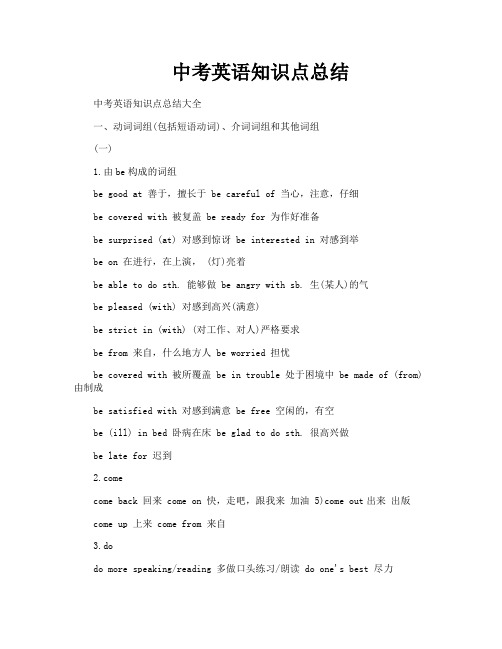
中考英语知识点总结中考英语知识点总结大全一、动词词组(包括短语动词)、介词词组和其他词组(一)1.由be构成的词组be good at 善于,擅长于 be careful of 当心,注意,仔细be covered with 被复盖 be ready for 为作好准备be surprised (at) 对感到惊讶 be interested in 对感到举be on 在进行,在上演, (灯)亮着be able to do sth. 能够做 be angry with sb. 生(某人)的气be pleased (with) 对感到高兴(满意)be strict in (with) (对工作、对人)严格要求be from 来自,什么地方人 be worried 担忧be covered with 被所覆盖 be in trouble 处于困境中 be made of (from) 由制成be satisfied with 对感到满意 be free 空闲的,有空be (ill) in bed 卧病在床 be glad to do sth. 很高兴做be late for 迟到ecome back 回来 come on 快,走吧,跟我来加油 5)come out出来出版come up 上来 come from 来自3.dodo more speaking/reading 多做口头练习/朗读 do one's best 尽力do some shopping (cooking reading, cleaning)买东西(做饭菜,读点书,大扫除)do morning exercises 做早操do eye exercises 做眼保健操 do well in 在某方面干得好4.get1)get ready for (=be ready for) 为作好准备 2)get on (well) with 与相处(好)3)get back 返回 4)get rid of 除掉,去除 5)get in 进入,收集6)get on/off 上/下车 7)get to 到达 8)get there 到达那里5.give1)give sb. a call 给打电话 2)give a talk 作报告3)give a lecture (a piano concert)作讲座(举行钢琴音乐会)4)give back 归还,送回 5)givesome advice on 给一些忠告6)give lessons to 给上课 7)give in 屈服 8)give up 放弃9) give sb. a chance 给一次机会6.go1)go ahead 先走,向前走,去吧,干吧 2)go to the cinema 看电影 3)go to bed 睡觉4)go to school (college) 上学(上大学) 5)go to (the) hospital 去医院看病6)go over 复习/ go over to 朝走去7)go fishing/skating/swimming/shopping 去钓鱼/滑冰/游泳/买东西8)go home (there) 回家去(去那儿) 9)go round 顺便去,绕道走10)go up 上去 11)go out for a walk 外出散步12)go on (doing) 继续(做)13)go upstairs/downstairs 上/下楼 14)(the lights) go out (灯)熄了7. havehave a football match (basketball match) 举行一场足球(蓝球)赛have a try 试一试 have a good/wonderful time 玩得很高兴 have a report (talk) on 听一个关于的报告have breakfast/lunch/supper 吃早饭/午饭/晚饭have a meal (three meals) 吃一顿饭(三餐饭) have (have got) a headache 头痛have a fever 发烧have a cough (a cold) 咳嗽(感冒) have a look (at) 看一看have a rest (a break) 休息一会儿(工间或课间休息) have a talk 谈话have a swim/walk 游泳/散步 have a sports meet (meeting) 开运动会have something done 让人(请人)做have a word with 与谈几句话8.helphelp sb. with sth. help sb. do sth. 在方面帮助帮助做help each other 互相帮助9.keep1)keep up with 跟上,不落后于2)keep silent/quiet 保持沉默/安静3)keep sb. doing sth. 使一直做4)keep one's diary 记日记10.make1)make a noise (a lot of noise, much noise, noises)吵闹(十分嘈杂,响声)2)make a living 谋生 3)make sb. do sth. 让某人做4)make faces (a face)做鬼脸5)make friends (with)与交朋友 6)make a mistake (mistakes)犯错误7.make room/space for 给腾出地方 8.make a sentence (sentences)with 用造句9)make a fire 生火11.look1)look out of (outside) 往外看(看外面) 2)look up a word (in the dictionary) 3)look up 往上看,仰望 4)look after 照管,照看,照顾5)look for 寻找6)look like 看上去像7)look fine/well/tired/worried 看起来气色好/健康/疲劳/忧虑8)look out 当心,小心 10)look around 朝四周看11)look at 看着12.put1)put on 穿上(衣服),戴上(帽子),上演(戏剧) 2)put up 建造,搭起,挂起,举起,张帖 4)put one's heart into 全神贯注于 put away 把放好 put off 推迟 put out 灭火5)putdown 把放下13.set1)set up 竖起,建起 3)set out 出发3.)set an example for 为树立榜样14.take1)take one's advice 听从某人劝告2)take out 拿出,取出3)take down 拿下4)take place 发生5)take one's place 坐的座位,代替某人职务6)take the place of 代替7)take a walk/rest 散步/休息8)take it easy 别紧张9)take care of 关心/照顾/保管10)take away 拿走 11)take off 脱下(衣,帽,鞋等)拿掉12)take (an active) part in (积极)参加(活动 13)take photos 拍照14)take some medicine 服药 15)take a bus/train, boat/ 乘公共汽车,火车/船15.turn1)turn on 开,旋开(电灯,收音机等) 2)turn off 关上(电灯,收音机等)3)turn in 交出,上交 4)turn down (把音量)调低 5)turnover 把翻过来重点句型1.I think意为“我认为”,是对某人或某事的看法或态度的一种句型。
中考英语精华知识点汇总

中考英语精华知识点汇总1、 as…as…结构:你和汤姆是一样好的孩子。
You’re a boy as good as Tom.=You’re as good a boy as Tom.2、 (1)too…to与 so…that sb. can’t…的句型转换:前者为简单句,主语只有一个,而后者为复合句,主语有两个,试比较:The man was too angry to be able to speak.The man was so angry that he wasn’t able to speak.(2) too…to…与 not enough to句型的转换:He is too young to get married.=He is not old enough to get married.The book is too difficult for me to read.=The book is not easy enough for me to read.3、 形容词原级表示比较级含义:约翰不象迈克那么苯。
John is not so stupid as Mike.John is less stupid than Mike.John is cleverer than Mike.4、 用比较级表示最高级:约翰是班里最高的男生。
John is taller than any other boy in the class.John is the tallest boy in the class.5、 the more….. the more….表示“越……越……”:The more books you read, the wider your knowledge is.The more food you eat, the fatter you are.6、 more and more….表示“越来……越……”:More and more students realized the importance of a foreign language.Our country is getting stronger and stronger.1. after, in 这两个介词都可以表示“……(时间)以后”的意思after 以过去为起点,表示过去一段时间之后,常用于过去时态的句子中?如:She went after three days. 她是三天以后走的in 以现在为起点,表将来一段时间以后,常用于将来时态的句子中如:She will go in three days. 她三天以后要走2. how long, how often, how soonhow long指多长时间,主要用来对一段时间(如three days, four weeks 等)提问?如:How long ago was it? 这是多久前的事了?how often指每隔多久,主要用来对频率副词或状语(如once a week等)提问?如:—How often does he come here? —Once a month. 他(每隔)多久来一次?每月一次。
中考英语知识点归纳汇总-详细
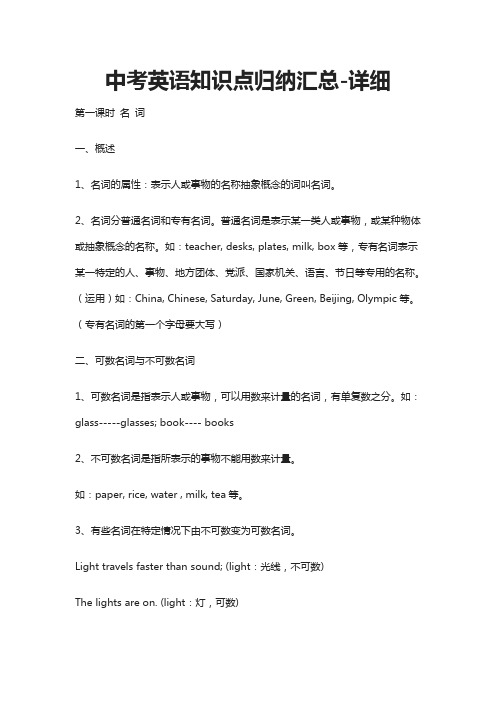
中考英语知识点归纳汇总-详细第一课时名词一、概述1、名词的属性:表示人或事物的名称抽象概念的词叫名词。
2、名词分普通名词和专有名词。
普通名词是表示某一类人或事物,或某种物体或抽象概念的名称。
如:teacher, desks, plates, milk, box等,专有名词表示某一特定的人、事物、地方团体、党派、国家机关、语言、节日等专用的名称。
(运用)如:China, Chinese, Saturday, June, Green, Beijing, Olympic等。
(专有名词的第一个字母要大写)二、可数名词与不可数名词1、可数名词是指表示人或事物,可以用数来计量的名词,有单复数之分。
如:glass-----glasses; book---- books2、不可数名词是指所表示的事物不能用数来计量。
如:paper, rice, water , milk, tea等。
3、有些名词在特定情况下由不可数变为可数名词。
Light travels faster than sound; (light:光线,不可数)The lights are on. (light:灯,可数)4、不可数名词的量的表示不可数名词一般无法用数来计算,前面不能用a或an或数词来表示数量,它的量往往借助于容器来表示。
如:a glass of milk ------ four glasses of milka piece of paper------two pieces of papera bag of rice------three bags of rice三、可数名词的复数形式(识记、运用)1、可数名词在应用时有单复数之分,单数变复数有规则变化和不规则变化两种。
规则变化情况变化形式例词一般情况加-sgirls; books;以s,x,ch,sh结尾的名词加-esclasses; boxes; watches;brushes以辅音字母加y结尾的名词变y为i, 加escity---cities; baby---babies以f或fe结尾的名词变f,fe为v, 加esknife---knives; leaf---leaves以O结尾的名词potatoes; tomatoes;photos; kilos; bamboos; radios 2、少数名词有不规则的变化形式policeman---policemen; man---men; woman---women; tooth---teeth; foot---feet; sheep---sheep; deer---deer; Japanese--- Japanese; Chinese --- Chinese; fish --- fish 四、名词所有格(运用)名词的所有格是表示所有关系的形式,它也有构成上的变化。
中考英语知识点归纳
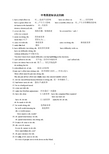
中考英语知识点归纳1. have a bad effect on 对......造成不良影响have no effect on 对……没有影响have a great effect on 对…产生巨大影响have a terrible effect on 对…产生非常糟糕的影响do harm to=be harmful to 对…有损害destroy (destroyed) sth. 破坏2. cover sth. live 现场直播,现场报道be covered live(adv.)a live (n.) concert3. insist on doing sth. 坚持做某事insist that +句子坚持认为。
4. carry on with sth. 继续某事carry on doing sth. 继续做某事5. make the bed 铺床6. have difficulty (in) doing sth. 做某事有困难have difficulty with +n.have no difficulty doing sth.without difficulty(不可数名词)You don’t know how much difficulty you had arriving at the decision.7. can’t afford to do sth. 买不起;没有时间做某事can’t afford sth.8. have no choice but to do sth. 除了。
别无其他选择do nothing but do9. rob(robbed) sb. of sth. 抢某人的某物10.put one’s effort into (doing) sth. 把全部精力放在…; 全身心投入More effort must be put into doing sth.She ahs put all her effort into study since she entered middle school.11. devote oneself/time/money/lifetime to doing sth. 把一身奉献给了…12. had better (not) do sth. 最好(不)做某事13. be in a bad/good mood14. come up with sth.15. make her first/last appearance 首次/最后一次露脸16. have sth. done 让人做某事have the computer/bike repairedhave my hair cuthave sb. do sth. 让人做某事make/let sb. do sth.sb. be made to do sth.17. be worth doing sth. 值得做某事be well worth listening to很值得听sth. is worth moneyHow much is sth. worth?18. sb. spend time/money on sth.sb. spend time/money (in) doing sth.19. It takes sb. time to do sth.20. sth. cost sb. moneyIt cost sb. money to do sth.How much does sth. cost?21. sb. pays (money) for sth.22. It’s adj. of sb. (not) to do sth.It’s wise of people not to look down on the blind.sb. be adj. enough to do sth.It’s adj. for sb. (not) to do sth.too adj. to 太而不能The problem is too difficult for him to work out.The problem is so difficult that he can’t work it out.23. get on well with sb. 与某人相处融洽get along (well) with sb.24. show off sth. 炫耀25. be used to sth./doing sth. 习惯于某事/适应做某事get used to doing sth. 习惯(强调动作)used to do sth. 过去常常(不需要in the past)There used to be a shoe factory here.sth. be used to do sth. =sth. be use for doing sth. 某事被用来...26.discuss sth. 讨论discuss sth. with sb.talk about sth. with sb. 与某人谈论chat with sb. 闲聊27.say: say sth. in English 有说的内容what to say in the meetingspeak: speak language 及物动词speak at the meeting 不及物动词tell: tell sb. (not) to do sth.tell a story/lietell the truthtell the difference between A and B 辨别28.put up a good fight against…与…进行殊死搏斗,激烈斗争put up a drawing 张贴put up one’s hand 举手put out 扑灭put away your books 收拾29.how to deal with…(dealt dealt dealing) 处理,解决,deal with people 和某人打交道deal with worries 对待烦恼what to do with…30.remind sb. to do sth. 提醒某人做某事remind sb. of sth. 使某人想起某事不能用remind sb. of doing sth.remind sb. that +句子be proud to do sth.be proud of sth.. 不能用be proud of doing sth.be proud that.+句子31.explain(explain ing) a difficult problem to sb.problem 问题,难题question 问题常用ask and answer 32.prefer Asth. to Bsth. 更喜欢AWhich do you prefer , Coffee or tea?I prefer coffee________ milk. (with)prefer doing A to doing Bwould rather do A than do B 必须有动词prefer to do A rather than do Bprefer(red) to do sth. 更喜欢做某事33.be of great value to sb.=be very valuable to sb.34.allow sb. to do sth. sb. be allowed to do sth.35.be strict with sb. in sth. (stricter)be satisfied with sb. in sth.36.keep a balance between work and rest 保持劳逸结合achieve a balance between play and study 在学习和玩之间取得平衡37.seem (not) to do sth. 似乎(不)做某事seem adj.It seems/seemed that…There seemed to be no hope of …38.…go/be far beyond…远远超过39.be considered as…被公认为…be chosen as/to be…被选举为…be recommended as/to be 被推荐为…be recommended for +职位/奖项40.The number of the tigers is getting/becoming smaller and smaller. (large)A large number of …(可数名词复数) = a lot ofThe population of China is larger than that of any other country in the world. (large/small) What’s the population of …?Wuxi has a population of …*One third of the population are farmers. 表示职业41.cheer sb. up 使某人振作起来42.on time 准时;按时(上班,到校,上交作业等)in time 及时at a time have one or two babies at a timeat times=from time to time=sometimesat all times-always=all the timeat the same timesome time 一段时间stay here for some timesome times 几次have been to Hong Kong for some timessometime 某时(常用一般过去时与一般将来时)visit there sometime next week43.take a close look at…近距离观察44.doubt if/whether…never doubt that…without/beyond doubt (n.)45.be seriously/badly hurtsmell terribly badbe terribly ill46. half a year half an hour half a monthone hour and a half=one and a half hoursHalf of the books are comics.Half of the work is done by us.47. much advice=many suggestionsgive/offer me advice on sth.advise sb. (not) to do sth. sb. be advised to do sth.One’s advice is worth taking. take one’s advice48. pay(pays, paid, paying) attention to doing sth. 毫不理会;注意;关注care about 关心,在乎notice sb. doing sth. 察觉到某人正在做某事49. make mistakes 犯错误make great progress in…取得巨大进步(不可数名词)make such great progress in…50. look after sb./oneself=take care of sb.=care for sb.look after sb. well=take good care of…51. refuse to do sth.52. accept the truth 接受receive a letter 收到53. break(broke, broken) into 闯入break down 损坏,出毛病(无被动)54. look down on 看不起laugh at 嘲笑55. spare sb. time =spare time for sb.I won’t have a minute to spare.56. compare A with Bconnect A to B57. get a concert ticket for free= get a free concert ticket58 leave sb. alonesb. be left alone59. I got up an hour earlier than usual in order not to miss the plane.The plane took off three hours late because of the snowstorm.60. often see sb. do sth. sb. be often seen to do 经常看到,看到整个过程(短动作)see sb. doing sth. sb. be seen doing sth. 被看到正在做某事61. reply to …对…作出反应, 回复There is no reply. n.62. imagine what life will be like in the future63. in the form of a diary/ice 呈现…的形式64. Action must be done to prevent the fire from spreading.Something must be done to prevent…65. be full of balloons of all coloursbe suitable for all ages66. The train/car is travelling/moving at a speed of 200 km per hour.at the speed of light/soundat full/top speed67. sth. need doing =sth. needs to be donesb. need to do sth. 主动情态动词needn’t do sth.实义动词don’t need sth. /to do sth.Must we…? Yes, you must. / No, you needn’t. (don’t have to/ don’t need to)sb. be required to do sth.68. present/honour sb. with sth. be honoured/presented with…provide sb. with sth. =provide sth. for sb.offer sb. sth.=offer sth. to sb. 主动提供n. 减价There is a special offer. an offer69. Thank you for doing sth. = be grateful to sb. for doing sth.回答:You are welcome. Not at all. It’s my pleasure.I’m sorry …回答:That’s all right. It doesn’t matter. Never mind.70. not… any more/longer = no longer 再也不,别再not… at all 一点也不,根本不71. The price of sth. is high(dear贵)/low.Sth is expensive/cheap.at the price of …72. How beautiful the song sounds!What useful advice it is!What fun it is to fly kites!73. be (quite/very/really) different from…the same as…the same weight/height/size asnot as/so…(adj./adv.) as…不如,不及as much/many as74. belong to sb. (代词用宾格,不被动)Who does the pen belong to? ---It belongs to him.Whose is this pen? ---It’s his.75. must be 表示肯定猜测can’t be 表示否定猜测,一定不是,不可能是---Mr. Smith must have been to your home this morning.--- No, he __________, because he didn’t know my address. (couldn’t)There is someone knocking at the door. Who can it be?It may be Mary, but I’m not sure. (根据I’m not sure)probably 大概,或许一般放句中She is probably kind.Maybe/perhaps 一般放句首76. comfortable—comfortably simple—simplygentle—gently terrible—terribly true—truly77. hope to do sth.hope that 宾语从句(时态常常是will+动词原形)wish sb. to do sth. wish sb. +n. wish you good luck78. an earthquake happened 偶然发生(无被动)the sports meeting took place…举行,发生(无被动)= the sports meeting was held sth. happen to sb. What happened to him?79. keep/prevent/stop sb. from doing sth. 阻止某人做某事如果是预防,用preventprotect sth. from sth. protect your eyes from the sunkeep someone safe from dangerkeep doing sth. 持续做某事80. I don’t know how far it is from A to B?Could you tell me how long your computer has had a virus?81. do sth. alone sit alonefeel/be lonely a lonely house82. do sth. for a living = make a living by doing sth.No one knew what he did for a living.live a happy/ simple life 过着快乐/简朴的生活make his lesson lively a lively boy 活泼的,生气勃勃的an active boy 积极的(参加活动等)stay alive bring sth. alive on screen 活着的,活生生的83. on either side of the road 任意一边(二选一)on each side of the road 每一边(不能用every ,表示三个以上)on both sides of the roadeither…or…要么…要么…二者选其一both…and…两者都not only…but also 不但…而且(就近原则)neither…nor…两者都不none of 三者以上都不注意nobody, anybody, everybody 不能与of 连用84. arrive at/in spl. (及物动词)get to spl. reach spl.When will you arrive? (不及物动词) Not until next Friday.85. among (三者以上)其中between…and…两者之中one…the other…一个,另一个(只有两个的情况下)another 另一个,其他的(三者以上)others=other people/things 别的人/物Shanghai is bigger than any other city in China.Shanghai is bigger than any city in the UK.86. get married to sb. be married to sb. 强调状态(后跟时间段)marry sb.I don’t know how long he has been married to her.87. play the lead role of the young princess 扮演…的角色play the lead role in the play/film 在剧中/电影中扮演主角play an important role/part in the activity 在活动中起着重要作用88. I don’t think/believe/ suppose that 我认为...不be supposed to do sth. =should do sth. 按照规定,理应做某事suppose that 句子料想,推断89. I didn’t know he was coming/would come yesterday.go, move, come, fly, leave 等趋向性动词进行时表示将来90. the man in his mid-fortieshis twentieth birthdayPeople in the 1990s like to wear jeans.ninth, ninety, nineteenth, ninetiethtwelfthone third, two thirdsmillions of students there are 2 thousand students.91. so adj./adv. that…如此,以至于,表达结果such n./n phrase that…so much traffic, much, few, little 前面用soso that+句子表达目的92. leave spl. 离开某地leave Wuxi for Shanghai 离开无锡到上海leave sth. at/in…把某物落在某地93. expect the rain will last 指望,期盼expect the rain to lastexcept 除了…nobody except youYou arrive earlier than I expected/thought/imagined.94. find it +adj. to do sth. make it adj.find adj. (dead)find doing (dying)rBe interested in …show interest in n.places of interest n.95. whatever= no matter what it is asked to do 无论什么anyway 单独使用adv. 无论如何,总之96. 躺lie lay lain 产卵lay laid laid 说谎lie lied lied97. show sb. around spl. 带领某人参观某地千万别写take sb. to visit98. be known to sb. It’s known to us that…大家都知道be well-known/famous as…作为…有名Wuxi is well-known as a modern city.be well-known/famous for 因为…有名Wuxi is well-known for Tai Lake.99. join the competition/Reading Club/ League 组织/俱乐部join in the sports meeting 参加活动join sb. in doing sth. 加入某人Would you like to join us in dancing?take an active part in …=take part in …actively 积极参加活动100. can’t help/stop doing sth. 情不自禁做某事can’t wait to do sth. 迫不及待做某事。
- 1、下载文档前请自行甄别文档内容的完整性,平台不提供额外的编辑、内容补充、找答案等附加服务。
- 2、"仅部分预览"的文档,不可在线预览部分如存在完整性等问题,可反馈申请退款(可完整预览的文档不适用该条件!)。
- 3、如文档侵犯您的权益,请联系客服反馈,我们会尽快为您处理(人工客服工作时间:9:00-18:30)。
2. suggest 作“暗示/表明”讲时,后加that从句,that可省略。其宾语 从句不能使用虚拟语气,而要使用陈述语气,且要注意和主句 suggest的时态对应。如:
His words suggested (that) he was unhappy. 他的话表明他很不开心。 宾语从句
What he said suggested (that) he felt very sleepy.
2. polite的反义词是impolite,相当于bad manners。如:
It is impolite to point at others with chopsticks. =It is bad manners to point at others with chopsticks. 用筷子指着别人是不礼貌的。
When you visit a foreign country, it is important to know how to
ask for help_________?
A. lately
B. widely
C. politely
解析:考查副词词义辨析。句意:当你出国访问的时候,如何有礼貌地 寻求帮助非常重要。根据When you visit a foreign country“当你出国访问 的时候”和ask for help“寻求帮助”可推知应该是有礼貌地寻求帮助。 答案: C
5. sth. be used as意为“某物被用作……”,as是介词,后面常接名词。
Stone began to be used as a roofing material. 石料开始被用作盖屋顶的材料。 The old table is used as a bed for that cat. 这张旧桌子被用作那只猫的床。
考点 1
1. suggest作“建议/提议”讲时,是及物动词。其用法有: (1)suggest sth (to sb) “(向某人)建议某事”。如:
I’ll suggest a new plan (to him). 我将向他建议一个新计划。 The English teacher suggested a trip to the Summer Palace next week. 英语老师建议下周去颐和园旅行。 (2)suggest doing sth. “建议做某事”。如: He suggested going fishing this afternoon. 他建议今天下午去钓鱼。
2. advise sb. (not) to do sth. “建议某人(不要)做某事”。如: He advised me not to buy a computer. 他建议我不要买电脑。 The doctor advised me to take a complete rest. 医生建议我好好休息。
他的话暗示他很困了。
宾语从句
易错警示
suggest是及物动词,其名词形式是suggestion,为可数名词, 复数形式是suggestions。近义词是 advice,但advice是不可 数名词ing sth. “建议做某事”。如: He advised going to the movie. 他建议去看电影。
3. sb. be/get used to (doing) sth. “某人习惯做某事”, to是介词,后边既可以接动名词,也可以接名词。如:
Lucy has been used to the life here. (名词作宾语) 露西已经习惯了这儿的生活。 I am not used to eating so much at lunch time. (动名词作宾语) 午饭时间我不习惯吃那么多。
do with意为“处理; 与……相处”,常与疑问代词what连用,do 是及物动词,其宾语是what,with后另外跟宾语。
What did you do with that notebook? 你把那个笔记本怎样啦?
What does it have to do with you? 与你何干? I'm sorry, but it has nothing to do with you. 对不起,但是这跟你没关系。
4. sth. be used for doing sth. 意为“某物被用来做……” ,相当于be used to do sth.。 for是介词,表用途,后边可加名词或动名词。如:
A pen is used for writing. (动名词) =A pen is used to write. (动词不定式) 钢笔是用来写字的。 Cretonne can be used for furniture covers and curtains. (名词) 印花棉布能被用来做家具套和窗帘。
考点 3
sb. used to do
sb. be/get used to doing
used
sth. be used to do
sth. be used as
sth. be used for
1. sb. used to do sth.意为“某人过去常常做某事;过去曾经做某事 ” (现在不再做了),used是动词的过去式; to do sth.是动词不定式。如:
(4)suggest + that从句“建议……”。 此时要求that从句使用虚拟语气,即 从句的谓语由“(should) + 动词原形”构成,且should可以省略。如:
He suggested (that) she (should) go to Beijing right away. 他建议她立刻去北京。 Lisa suggested that the class meeting (should) be put off. 丽萨建议班会延期召开。 His parents suggested that he (should) study English hard. 他父母建议他努力学英语。
—How is our government going to _d_e_a_l_w_i_th__(处理) the office building? — It will be turned into a library.
解析:考查动词短语辨析。句意:—我们的政府将如何处理这栋办 公楼?—它将会被改建成一个图书馆。 与how连用的“处理”是 deal with。be going to do sth. “打算做某事”。 答案: deal with
Mr. Green used to live in London. 格林先生过去住在伦敦。 She used to be heavy, but now she is tall and thin. 她过去很胖,但是现在又高又瘦。
2. sth. be used to do sth. 意为“某物被用来做某事 ”,be used是动词的被动结构; to do sth.是动词不定式。如:
(咸宁中考)
— Could you give me a few ___ on how to spend the coming summer holiday?
— OK, let me see.
A. hobbies
B. suggestions C. knowledge D. information
解析:考查名词词义辨析。句意:——你能给我一些关于如何度过即 将到来的暑假的建议吗?——好的,让我想想。a few“少许;少数; 些许” 后加可数名词复数。knowledge和information都是不可数名词,所以排 除C和D。又根据on how to spend the coming summer holiday“关于如何 过暑假”可推知,是寻求“建议”的 。 答案: B
考点 2
1. polite是形容词,意为“有礼貌的; 有教养的;文雅的; 上流社会 的; 应酬的;客套的”, 相当于good manners。其比较级是:politer 最高级:politest。在句中可以作表语、定语、补语等。如:
As a polite man, it is his duty to respect the old. (作定语) 作为一个有教养的人,尊敬老人是他的责任。 Everyone around him is trying to be polite. (作表语) 他周围的每一个人都想表现出彬彬有礼的样子。
The headmaster suggested building a reading room in front of the teaching building. 校长建议在教学楼前建一个阅览室。
(3)suggest sb. /one’s doing sth. “建议某人做某事”。 You should suggest him/his giving up smoking. 你应该建议他戒烟。 The woman suggested me/ my wearing more clothes in such cold weather. 这个妇女建议我在这么冷的天多穿点。
3. polite的副词是politely,主要修饰动词, 在句中作状语。如:
We should speak to the old politely. 我们应该有礼貌地对老人说话。 Andrew politely turned down the invitation. 安德鲁有礼貌地拒绝了邀请。
